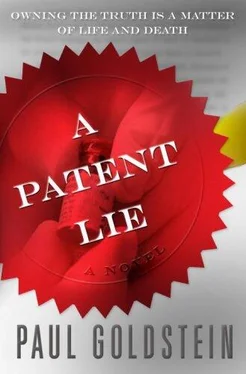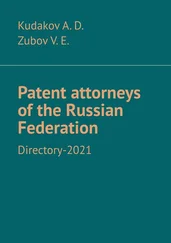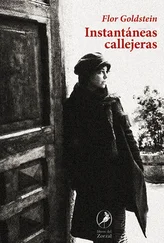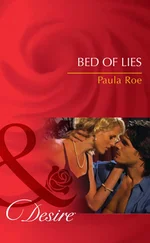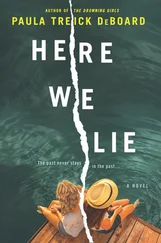Paul Goldstein - A Patent Lie
Здесь есть возможность читать онлайн «Paul Goldstein - A Patent Lie» весь текст электронной книги совершенно бесплатно (целиком полную версию без сокращений). В некоторых случаях можно слушать аудио, скачать через торрент в формате fb2 и присутствует краткое содержание. Жанр: Криминальный детектив, на английском языке. Описание произведения, (предисловие) а так же отзывы посетителей доступны на портале библиотеки ЛибКат.
- Название:A Patent Lie
- Автор:
- Жанр:
- Год:неизвестен
- ISBN:нет данных
- Рейтинг книги:3 / 5. Голосов: 1
-
Избранное:Добавить в избранное
- Отзывы:
-
Ваша оценка:
- 60
- 1
- 2
- 3
- 4
- 5
A Patent Lie: краткое содержание, описание и аннотация
Предлагаем к чтению аннотацию, описание, краткое содержание или предисловие (зависит от того, что написал сам автор книги «A Patent Lie»). Если вы не нашли необходимую информацию о книге — напишите в комментариях, мы постараемся отыскать её.
A Patent Lie — читать онлайн бесплатно полную книгу (весь текст) целиком
Ниже представлен текст книги, разбитый по страницам. Система сохранения места последней прочитанной страницы, позволяет с удобством читать онлайн бесплатно книгу «A Patent Lie», без необходимости каждый раз заново искать на чём Вы остановились. Поставьте закладку, и сможете в любой момент перейти на страницу, на которой закончили чтение.
Интервал:
Закладка:
The waitress brought their food, Seeley's a heaped pile of crisp-battered Pacific oysters, each as fat as a baby's fist. A mound of creamy coleslaw was on the side. Warren started on her salad, and he bit into an oyster. Palmieri was right. Seeley had not tasted anything like this before. First, there was the sensation of the grainy, almost buttery crust, and then the sudden astonishment of the oyster's intense flavor exploding and liquefying in his mouth like the essence of the ocean itself. There was a genius at work in the kitchen, someone who knew the secrets of frying seafood.
Seeley looked around the room with its corny nautical decorations hanging from the ceiling and walls. Behind the cashier's stand was a small open kitchen, with the cooks' busy white backs. Every fifteen seconds the booming of a foghorn punctuated the background buzz of conversation.
While they ate, Lily, with Seeley's encouragement, talked about herself. She grew up in China, came to the United States on a student visa for graduate and postgraduate work, married Warren, a Canadian software engineer living in the United States, and ended the marriage two years later when she failed her husband's expectations of a dutiful Asian wife and refused to give up her career to have children. By this time, she had already started publishing articles in immunology under her married name, and so continued using it after the divorce. When Steinhardt left UC for Vaxtek, he offered her a position in his new lab, but she went to St. Gall instead, converting her F-1 student visa to an H-1.
Unlike other lawyers, Seeley took little pleasure in recounting trial stories, but when Lily asked him about patent cases he'd worked on, she seemed genuinely inquisitive. He was telling her about a case seven years ago, involving a drug-coated stent that had so revolutionized cardiovascular surgery that demand from surgeons across the country overwhelmed his client's capacity to supply the market, when a shrewd light went on in her eyes.
“I bet that instead of trying to shut down the infringers, you just asked the court to make them pay a license fee.”
Her quickness stunned him. “How did you know?”
“Greed is an unattractive quality. Your client couldn't supply the market by itself. Patients needed the stent. It would have been bad strategy to ask for more.”
“If we said it was all or nothing, the court probably would have struck down the patent and given us nothing.” For the first time in a long time, Seeley was enjoying a conversation.
“That's the difference between science and law,” Lily said. “In law you can divide things up so everyone gets something. In scientific research there's only one winner and lots of losers.”
The way she said the word told Seeley that Lily would not accept being one of the losers.
“Had a lawyer ever done that in a patent case-not try to shut down his competition?”
Seeley shook his head. “Sometimes the hardest part of a case is convincing the client to do the right thing.”
“And you're always so confident about knowing the right thing to do?”
When Seeley returned her smile he realized that he was flirting with her. “In trials, sure.”
The waitress cleared away their plates and flipped her pad open for dessert orders. “The Snickers bar pie is one of our specialities.” Lily shook her head and said tea would be fine. Seeley asked for coffee.
“You enjoy eating, don't you?”
“Sure,” Seeley said, “when the food's as good as this.”
“Do you like dim sum?”
When Seeley nodded, she said, “In China people have it for breakfast or lunch. I like it for dinner. And mine's better than what you can get in a restaurant.”
Seeley didn't know where this was going.
“Your reflexes outside the courtroom could be better. That was a dinner invitation.”
“Just like that?”
“Why not?”
“I'm going to trial in three days.”
“You still have to eat dinner. My apartment's in Half Moon Bay-it's only forty minutes from the city.”
“Why?”
“I already told you. If I'm going to talk to you, I need to know you better.”
“When you left UC, why didn't you go to Vaxtek with Steinhardt?”
“How about next Tuesday?” She had taken a leather-bound calendar from her purse.
“I'd like that. But finish telling me about you and Steinhardt.” Tell me, Seeley thought, what your feelings were for this arrogant peacock.
“When he went to Vaxtek I'd already worked with him for three years. It seemed like a good time for me to move to a different lab.”
“Did you have him over for dim sum dinners?”
The porcelain cheeks colored, and Seeley wondered how seriously he had overstepped.
But her voice was even; she seemed neither angry nor embarrassed. “I had a relationship with Alan, if that's what you mean.”
Either Steinhardt was lying when he said that her crush was unrequited or Lily was. Seeley decided to believe her, even though he couldn't picture her in Steinhardt's arms nor him in hers.
She read his reaction as surprise. “Which stereotype are you sticking me with-cool, dispassionate scientist or chaste Chinese lady?”
“Neither. It's just that-”
She laughed. “I like discovering things, finding out what goes on behind the professional front that people wear. Alan is a very interesting man, and even though it didn't last long, I'm glad we had a relationship.” This time she enunciated the word carefully, as if it might explode. She looked directly at Seeley. “You're an interesting man, too. Even enigmatic.”
“How so?”
“You come on tough and in control, but when the waitress asked you what you wanted to drink, the way you looked at that row of beer bottles, you could have been a teenager mooning over a pretty girl.”
Seeley reminded himself to be more careful the next time he took a scientist to lunch.
“I can understand your leaving Steinhardt's lab, but why'd you go to a place the size of St. Gall? I'd think you'd be afraid you'd get lost there.”
She studied Seeley and waited a moment before she spoke. “That's what Alan said. But it was either that or get lost in his shadow. Alan's not the kind of person who shares credit.”
This made more sense to Seeley than what she said before. “But when, out of nowhere, he tells you he wants to publish articles with you, you go to his lab to see him.”
“I believed him. People change.”
Sure they do, Seeley thought. In the case of people like Steinhardt they get worse.
“Alan was right about St. Gall not giving me the recognition I deserved.”
“They were ready to have you testify in court that you invented AV/AS.”
“That was only after Vaxtek sued them, and it was their lawyer's idea. They thought a woman scientist would play well to a San Francisco jury.”
Emil Thorpe would know exactly what worked with a San Francisco jury. “So, before anyone knew there would be a lawsuit, you went to see Steinhardt and he left you alone in his lab-”
“He had to go to his office to get the UC notebooks.”
“And a security guard found you.”
“It wasn't a big deal. As soon as Alan came back he told the guard I was with him.”
“But the guard wrote in his report that you were there alone.”
She saw where Seeley's questions were going: that Steinhardt had set her up, creating an appearance of industrial espionage, with her as the spy. “No one would have known I was there if one of the lawyers in your office hadn't connected the guard's log and the witness list.”
“And St. Gall dropped you as a witness because they thought you stole Vaxtek's secrets.”
“Isn't that why you're asking all these questions?”
“Why did St. Gall make you promise not to talk about what happened?” “They fired me, but they got me a job at a small start-up they're financing in Half Moon Bay.”
Читать дальшеИнтервал:
Закладка:
Похожие книги на «A Patent Lie»
Представляем Вашему вниманию похожие книги на «A Patent Lie» списком для выбора. Мы отобрали схожую по названию и смыслу литературу в надежде предоставить читателям больше вариантов отыскать новые, интересные, ещё непрочитанные произведения.
Обсуждение, отзывы о книге «A Patent Lie» и просто собственные мнения читателей. Оставьте ваши комментарии, напишите, что Вы думаете о произведении, его смысле или главных героях. Укажите что конкретно понравилось, а что нет, и почему Вы так считаете.
